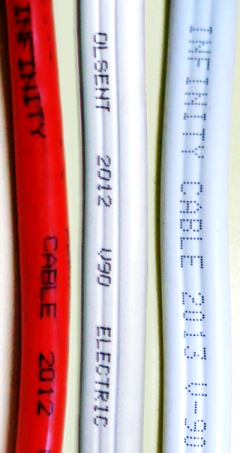Cable recall crawling along
 Progress has been slow for a recall of dodgy electrical cabling installed in thousands of Australian homes.
Progress has been slow for a recall of dodgy electrical cabling installed in thousands of Australian homes.
Authorities say the risk grows every day as the cables are more susceptible to splitting over time.
Less than half (just 39 per cent) of the 2,300 kilometres of Infinity and Olsent-branded cable has been recalled in the nearly three years since the fault was detected.
The cabling, particularly the white coloured variety, becomes brittle with heat. This makes it susceptible to cracks and breaks in hot areas near lights, vents and appliances, which could easily lead to a fire.
It was first installed in homes in NSW in 2010, and authorities are worried that as the years pass, more residents will be at risk.
“The experts tell us that in a worst-case scenario, the cable could become defective as soon as April this year,” said Australian Competition and Consumer Commission (ACCC) deputy chair Delia Rickard.
She said the people responsible for buying the cable were the most keen to see it removed.
“There's a whole range of reasons we think why people haven't taken action, it seems some suppliers and electricians are more proactive than others in terms of going out and trying to locate it, there's issues with electricians having very poor records about where the cabling was installed,” Ms Rickard said.
“I think there may be a sense of complacency from some home owners that they have time on their side so they don't need to contact their installer to check.”
Much of the cable was purchased at Masters, which is in the process of being either sold or shut down by its owner Woolworths.
Woolworths says the recall will continue regardless of what happens to the company.
Master Electricians Australia (MEA) has deflected most of the blame for the shonky wiring on to home handymen.
“The nature of where this product was sold and the lengths of the cable that was sold was not normal for an electrical contractor to purchase in that manner, which leads me to believe there has been a lot of home handyman work,” MEA spokesperson Malcolm Richards told the ABC.
“I've asked the regulators to give an amnesty to these people so they won't be prosecuted for unlicensed work, but at the end of the day their own family's life is more important than any possible retribution from using this cabling in an unlicensed manner.”
He said there should be stronger controls to stop crooked cables reaching Australia.
“We've got a border protection policy for other items coming into the country, we need to expand that policy to deal with electrical products as well,” he said.
“In the normal course of duties our Customs inspects products coming into the country, assesses them for guns, drugs and even tax-compliance issues.
“When they identify a specific product that they've been notified through our state regulators that is of concern or under watch, they can isolate that product and allow the state regulators to view and confirm the product is safe or otherwise.
“Other countries have a very coordinated program between their customs service and safety regulators to stop products at the border.
“Unfortunately in Australia this process doesn't happen which leaves our borders wide open to anything that any overseas country wants to send here.”








 Print
Print